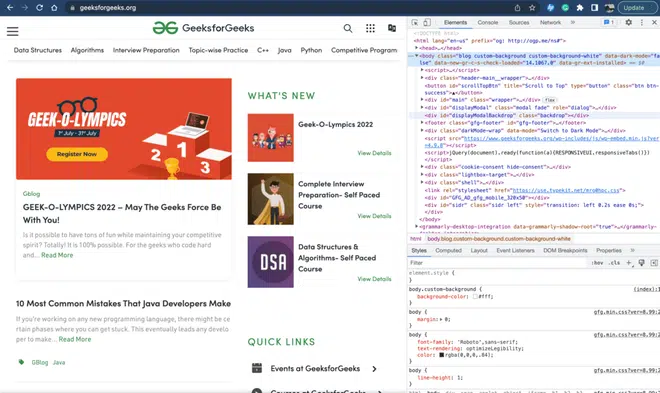|
IN BRIEF
|
Web developers often encounter various technical issues that can hinder their productivity. Understanding the recommended browser fixes is crucial for troubleshooting and enhancing the overall development experience. From dealing with JavaScript errors to addressing slow performance, implementing effective solutions can streamline workflows and optimize coding tasks. This guide explores key strategies to resolve common browser-related challenges developers face while working in today’s dynamic web environment.
In the fast-paced world of web development, it is crucial to have a smooth browser experience. Various browser fixes can greatly enhance the performance and compatibility needed to develop optimal web applications. This article explores the key advantages and disadvantages of common browser fixes that developers may employ.
Advantages
Utilizing browser fixes can dramatically improve the efficiency of web development. One significant advantage is the enhanced performance in areas such as speed and responsiveness. Developers often face issues like slow load times, which can be alleviated by implementing simple fixes. For instance, following guidelines from Airtel’s guide to optimize Google Chrome can lead to remarkable improvements.
Another clear benefit is compatibility. Developers need to ensure their web applications perform well across various browsers. Employing recommended fixes helps in resolving issues related to JavaScript errors, enabling a more seamless experience. Solutions for common problems can be found at Fix Your Browser.
Disadvantages
Despite the numerous advantages, there are also some disadvantages to consider when applying browser fixes. One major concern is the potential for over-optimization which might create new problems rather than solving existing ones. Developers may rely on fixes that work for specific setups without testing rigorously across different environments, leading to unexpected outcomes.
Additionally, implementing fixes can sometimes require a steep learning curve. For developers less acquainted with browser-specific tools, troubleshooting can become time-consuming. Resources like YouTeam can help mitigate this gap, but the learning process remains a hurdle.
Moreover, relying too heavily on fixes can hinder a developer’s understanding of underlying issues. It is essential to acquire knowledge about native browser features instead of continually applying fixes that may mask true problems. A balanced approach toward browser fixes is imperative for maintaining coding proficiency.
For further insights into browser fixes, including common solutions and diagnostics, check Fix Your Browser.
In today’s fast-paced web development environment, it’s crucial to have your browser functioning optimally. Many developers encounter issues that can hinder their workflow. This guide explores essential browser fixes that every developer should consider implementing to enhance their productivity and streamline their coding experience.
Common Browser Issues
As a developer, you might face various problems such as slow performance, crashing, or even audio issues while testing websites. Understanding these common issues can help in identifying effective fixes. It’s important to be familiar with different fixes depending on the issue at hand.
Performance Optimization
One of the most frequent complaints developers have is about slow browser performance. To tackle this, consider clearing your browsing data regularly. This action can free up resources and enhance loading times. Additionally, utilizing browser extensions that optimize your workflow can also significantly improve your experience. For a complete guide on performance fixes, check out effective browser fixes for crashing.
Audio Problems
Audio issues can be particularly frustrating when debugging multimedia content. A common fix involves checking the browser’s permissions to ensure audio is not being blocked. For more specific solutions on addressing audio problems, visit this link.
Flash Player Issues
Although the use of Flash has significantly declined, developers may still encounter issues related to it. Updating your browser to the latest version or enabling Flash in your browser settings can resolve these problems. For a detailed overview of fixes, refer to this article.
Redirect Problems
Redirect issues can create a significant barrier, making it hard to access necessary resources. Checking for any misconfigurations within the browser settings or ensuring proper URLs are in use can help. For a comprehensive list of recommended fixes, see this resource.
Keeping Your Browser Updated
Regularly updating your browser is one of the simplest yet most effective ways to avoid a plethora of issues. Updates often contain crucial security patches and improvements that enhance overall functionality. Always ensure that you are using the latest version of your preferred browser.
Conclusion on Browser Compatibility
Given the variety of browsers available, it’s wise for developers to test on multiple platforms to ensure compatibility. Utilizing tools like Google Chrome and Firefox Developer Edition can provide robust developer tools that facilitate thorough testing. For a deeper understanding of the best browsers for developers, visit BrowserStack for a comparative analysis.

Web developers often encounter various issues that can hinder their work. Keeping browsers optimized and functioning well is essential for an efficient development process. Below, we explore effective fixes and tricks that developers can implement to address common browser problems.
Improving Performance
Optimizing the performance of browsers is crucial for web development. One of the most effective strategies to achieve this is by managing browser extensions. Excessive or outdated extensions can slow down performance significantly, so it’s essential to evaluate and disable those that are not in use. For more detailed tips on enhancing browsing speed, visit this guide.
Error Resolution Techniques
Browser errors can be a developer’s nightmare. A common solution is clearing the cache and cookies, which can sometimes resolve persistent issues with loading and scripts. Additionally, developers should check the developer console for specific error messages that can guide them in troubleshooting. For a comprehensive list of fixes, refer to recommended fixes.
Utilizing Developer Tools
Modern browsers come with robust developer tools that facilitate debugging and testing. The Firefox Developer Edition, for instance, is tailored specifically for developers, offering advanced tools and features for efficient coding. It’s vital for developers to familiarize themselves with tools provided in browsers like Chrome and Brave, which are known for their high-performance developer utilities. Learn more about the capabilities of these tools on this page.
Cross-Browser Compatibility
Developers must ensure that their web applications function seamlessly across different browsers. Regularly testing on various browsers such as Microsoft Edge, Safari, and others is crucial for identifying compatibility issues. Begin by understanding the concept of progressive enhancement and gradually integrate features for newer browsers. For additional insights into browser compatibility, check out this resource.
Recommended Browser Fixes for Developers
| Issue | Recommended Fix |
| Slow Performance | Clear cache and disable unnecessary extensions. |
| Javascript Errors | Use the built-in console to debug and fix syntax issues. |
| Redirection Problems | Check server configuration for .htaccess rules. |
| Crashes | Update your browser to the latest version. |
| Audio Issues | Adjust browser settings and check sound output devices. |
| DNS Problems | Flush the DNS cache and reset network settings. |
| Flash Player Issues | Ensure Flash is enabled and updated in browser settings. |

Recommended Browser Fixes for Developers
Many developers encounter various issues while working with different web browsers. One common recommendation is to always ensure that you have the latest browser version installed, as updates often include important fixes and performance enhancements. Regularly updating your browser can resolve unexpected crashes or sluggish performance.
Another vital fix is to clear your cache and cookies. Over time, accumulated data can lead to improper functioning of websites. By frequently clearing these files, developers can ensure they are working with the most current versions of web pages without any outdated elements interfering.
Utilizing the built-in developer tools can significantly aid in troubleshooting. Features like the console can help identify errors or malfunctioning scripts, allowing developers to pinpoint exactly where the issue lies. Furthermore, the debugger tool can step through code and provide insights into performance hiccups.
For issues specific to certain functionalities, checking browser extensions and their permissions is essential. Sometimes, extensions can conflict with web pages or applications, leading to unforeseen issues. Disabling unnecessary extensions can often resolve these conflicts.
Moreover, ensuring that your JavaScript is enabled is fundamental for most web applications to function correctly. Some browsers have JavaScript turned off by default for security reasons, so developers should verify that it is enabled in settings.
Lastly, employing a cross-browser testing tool can help detect compatibility issues early in the development process. This approach ensures that any inconsistencies across different browsers are identified and fixed before deployment, streamlining the overall development workflow.
Recommended Browser Fixes for Developers
In the fast-paced world of web development, developers often encounter various issues that hinder productivity and performance. It’s crucial to have an arsenal of recommended fixes at hand to tackle common browser-related problems efficiently. This article discusses essential browser fixes that can enhance development workflows, improve compatibility, and ensure a smoother coding experience.
Common Browser Issues
Web developers frequently face a range of issues when using browsers. These can include performance slowdowns, compatibility errors, and even unexpected crashes. Understanding the root causes of these problems is essential for implementing effective fixes. Browsers can present unique challenges due to their varying support for web standards and the integration of third-party tools and extensions.
1. Slow Performance Solutions
One of the most common issues is browser lag. Optimizing your browser’s performance can significantly enhance your development experience. Here are some effective solutions:
- Clear Cache: Regularly clear your browser cache to ensure that outdated files do not slow down loading times.
- Disable Unnecessary Extensions: Pinpoint which extensions are essential for your workflow and disable the rest to free up resources.
- Update the Browser: Always use the latest version to benefit from performance improvements and bug fixes.
2. Fixing Compatibility Challenges
Different browsers may interpret code differently, leading to compatibility issues. To address these:
- Test on Multiple Browsers: Regularly test your applications across different browsers, including Chrome, Firefox, Safari, and Edge.
- Utilize Developer Tools: Leverage built-in developer tools to identify compatibility issues and debug your code directly within the browser.
- Employ Feature Detection: Use libraries like Modernizr to implement feature detection rather than relying solely on user-agent strings.
3. Resolving JavaScript Errors
JavaScript errors can prevent applications from functioning as intended. Here are some strategies to troubleshoot and fix these issues:
- Check Console for Errors: Open the developer console to view any JavaScript errors and troubleshoot from there.
- Utilize Linting Tools: Integrate tools like ESLint to catch errors during development before they make it into production.
- Debugging Techniques: Make use of step-by-step debugging tools available in browsers to isolate issues in your JavaScript code.
4. Browser Crashes and Freezes
When a browser frequently crashes, it disrupts the development workflow. To mitigate these interruptions:
- Monitor Resource Usage: Keep an eye on CPU and memory usage within task manager to identify any problematic tabs or extensions.
- Profile Page Loads: Use performance profiling tools to understand which resources may be causing crashes or long load times.
- Reset Browser Settings: Consider resetting your browser to its default settings as a last resort to resolve persistent issues.
5. Addressing Security Warnings
Sometimes, browsers may block content due to security settings. To handle these warnings effectively:
- Update Security Settings: Review and adjust security settings to allow for development processes, while still maintaining necessary safeguards.
- Test in Incognito Mode: Using incognito mode minimizes the effect of extensions and cached data, allowing for cleaner testing.
- Use HTTPS: Ensure that your development environment supports HTTPS to help mitigate security warnings regarding mixed content.

Recommended Browser Fixes for Developers
In the rapidly evolving landscape of web development, addressing browser-related issues is crucial for maintaining an optimal workflow. Developers often encounter a range of problems, from slow performance to JavaScript errors, that can impede their productivity. By relying on specific and efficient fixes, developers can enhance their coding experience and minimize disruptions.
One common fix involves optimizing browser settings to improve loading speeds and decrease latency. This can be achieved by clearing cache and cookies, which often accumulate over time and slow down web performance. Additionally, utilizing browser extensions that enhance productivity or disable unnecessary animations and scripts can further streamline the development process.
When facing JavaScript errors, the browser’s Developer Tools come in handy. These tools allow developers to debug scripts and identify issues with ease. Organizations should encourage their developers to familiarize themselves with these tools, as they provide invaluable insights into code performance.
For responsive design testing, multi-device compatibility is essential. Developers should regularly test their work across different browsers such as Chrome, Firefox, Safari, and Edge to ensure consistent behavior. Utilizing tools like Responsive Design Mode in browsers can simplify this process and reveal how a site performs across various screen sizes.
Lastly, understanding how to address security issues is vital. This includes keeping browsers updated to patch any vulnerabilities and using safety features to protect against potential breaches. By implementing these browser fixes, developers can create a smoother and more efficient web development environment.
